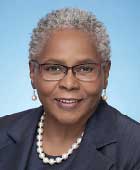APA Leads the Way!

In my first column I wrote about one of the three areas I discussed in my Opening Session speech. In this column I want to discuss another—those activities that are often described as “social” issues that impact mental health and how organized psychiatry can and should respond in these situations. However, when I addressed this topic at the Annual Meeting, I had no way of knowing I would soon have the opportunity to advocate for just such an issue as part of a growing national crisis.
Within three weeks of assuming the presidency, we again learned how important APA’s advocacy efforts are in changing policy that can effect a change in practice. You may recall that was when the administration began its practice of separating children from their parents at the U.S. southern border. I immediately heard from several members with suggestions regarding how APA might respond in this situation. Ultimately it led to one of my first presidential actions, the approval and release on May 30 of the APA Statement Opposing Separation of Children From Parents at the Border.
APA was one of the first medical associations to speak out against this harmful policy. And when the administration reversed that policy and ordered the reunification of families, we again went on record supporting that it be done as quickly as possible and that it include access to services and supports needed to minimize the likely trauma suffered by the children and their parents. In our most recent communication, we called upon Congress to fully examine the harmful practice of separating families so that it doesn’t occur again and that the children who remain in custody are returned to their parents and receive the care they need.
Also included in that statement were options for how interested psychiatrists could volunteer their services to assist these individuals. I am pleased to announce that since publication of that notice, we have received additional information from another organization—our long-time partner, Give an Hour. Some APA members may remember that through the APA Foundation, we partnered with Give an Hour years ago to offer our members an opportunity to join its network of volunteer providers of mental health treatment for returning military personnel, veterans, and their families. During this latest national crisis Give an Hour has joined groups like Lutheran Family Services, Catholic Charities, and Physicians for Human Rights to assure pro bono psychiatric services are available to immigrant families as they are being reunited. As we hear from more organizations engaged in this work, we will make that information available to you. And you will find more details about how you can help on APA’s website.
Other ways you can become involved and make your voice heard include speaking out on social media about the lifelong health and mental health consequences of the separation practice—use the following hashtags #FamiliesBelongTogether and #EndFamilySeparation. Or you can write the administration urging that services be available for these children and their families. The APA Division of Communications can assist you if needed. This is one of those “social” issues I mentioned in which I think APA can serve as a role model for how to deal with these challenges when they arise. I realize that the 37,000-plus members of APA may not agree on all aspects of the nation’s immigration policies, but I believe that as physician experts in mental health, we understand the serious medical and health consequences of the stress and trauma experienced because of the separation policy. And I hope we can all agree that it is our professional responsibility to lead the way in advocating for how the nation should respond in such situations. I look forward to hearing from you as this issue continues to unfold. ■



